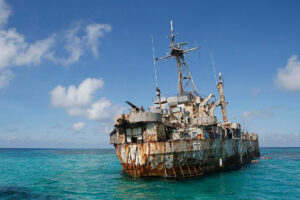By Kyle Aristophere T. Atienza, Reporter
SECURITY experts on Wednesday criticized the paltry share of the Philippines in the United States’ $95-billion (P5.5 trillion) aid package — mostly military assistance to Ukraine, Israel and Taiwan and US partners in the Indo-Pacific region — saying Manila should demand more as it deals with China, the world’s biggest naval power.
The Philippines will get $500 million in aid under a US Senate-approved bill, compared with $61 billion for Ukraine’s efforts against Russia’s invasion and $26 billion for Israel and humanitarian aid for civilians in conflict zones around the world.
The Philippine share is part of the $8.12 billion allotted to “counter communist China” in the Indo-Pacific region.
“Since a conflict could spark at any time due to miscalculations or decisive escalations, aid is better than none,” said Joshua Bernard B. Espeña, vice-president at Manila-based International Development and Security Cooperation.
“However, the Philippines must negotiate for a bigger yet granulated piece of the pie if both allies are serious about building up Philippine defense,” he said in a Facebook Messenger chat.
With a 79–18 vote in the US Senate, the proposed package that President Joseph R. Biden is expected to sign this week is seen as a bipartisan victory, getting support from most Democrats and traditional Republicans wary of ultra-nationalist sentiments among their ranks.
The House passed its version of the proposed package on Saturday in the form of individual bills combined for Senate action.
“I expect that given the strong bipartisan congressional support, Manila has reasons to be optimistic in asking for these reasonable packages given the mutual security concerns posed by China,” Mr. Espeña said.
He added that the US should offer a more affordable package for the Philippines’ planned acquisition of combat aircraft under its Multirole Fighter program.
President Ferdinand R. Marcos, Jr. in February said the Philippines was on the frontline of a battle for regional peace as it faces China’s growing assertiveness in the South China Sea.
China claims the waterway almost in its entirety, including waters that fall within the Philippines’ exclusive economic zone.
It continues to block resupply missions at Second Thomas Shoal, where Manila grounded a World War II-era ship in 1999 to assert its sovereignty, by firing water cannons at much smaller Philippine boats.
Richard J. Heydarian, a senior lecturer at the Asian Center of the University of the Philippines, said the Philippines got less 1% of the aid package while it is “bullied by the world’s largest naval power.”
“Even Jordan and Pakistan have enjoyed far more defense aid and modern weapon transfers than the Philippines,” he tweeted.
‘SELLING OUT’
The Philippines and the US have been treaty allies since 1951, when the two countries signed their Mutual Defense Treaty, which compels both sides to defend each other in case of an armed attack.
The treaty was updated last year to cover attacks on the Philippine armed forces, vessels and other assets in the South China Sea.
House Speaker Ferdinand Martin G. Romualdez said the bipartisan measure was a result of “extensive deliberations” between a Philippine delegation that he led and American legislators at Capitol Hill in Washington, D.C.
The deliberations coincided with the recent trilateral summit among Mr. Biden, Mr. Marcos and Japanese Prime Minister Fumio Kishida, he added.
“The aid package comes with strings attached and it involves the selling out of our sovereignty,” Bagong Alyansang Makabayan Secretary-General Raymond Palatino said in a Facebook Messenger chat.
He noted that the US does not pay for military bases under its 2014 Enhanced Defense Cooperation Agreement (EDCA) with the Philippines.
Mr. Marcos has expanded the deal, giving the US access to four more sites on top of the five existing ones.
“A pitiful price tag for allowing the US to turn the country into an extension of its military network,” Mr. Palatino said. “Only corrupt officials of the Marcos government stand to benefit from this aid coming from the world’s biggest enabler of genocide and war profiteer.”
It is in Washington’s best interest to invest more in its key allies in the region, Don Mclain Gill, who teaches international relations at De La Salle University, said via Messenger chat.
“For the past two decades, China has significantly controlled the South China Sea short of [declaring] war with the US,” he said. “The Philippines is at the frontline of an emerging geopolitical transition in the world, particularly with China’s growing assertiveness and expansionist ambitions.”
Mr. Gill said US policymakers should keep in mind that Washington’s preoccupation away from the region at the start of the 21st century had set the ground for China’s expansionism, “which can critically derail not just regional, but also international security.”
Mr. Espeña urged the Marcos government to “maximize all the funds by identifying which capabilities in the Armed Forces of the Philippines needed short and long-term modernization.”
